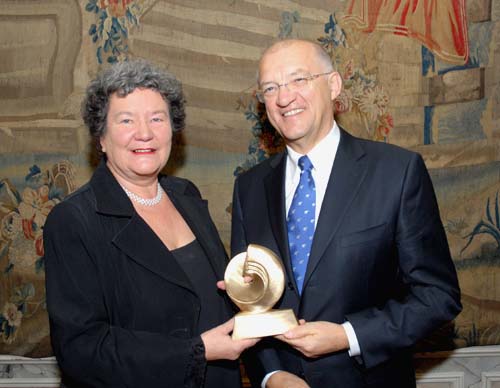The Minister of Education and Chairman of the Percy Wolf Awards Committee announced that the awards, totaling 100 DKK, will be awarded this coming May to seven world-renowned scientists from the USA, England, France, Austria and Germany, who research and work in the fields of medicine, physics, mathematics and agriculture

The Wolf Prize in Medicine for 2010 will be awarded to Prof. Axel Ullrich from the Max Planck Institute of Biochemistry in Munich, Germany, for his research, which constitutes an important breakthrough in cancer research, which led to the development of innovative drugs, including 'Herceptin' - a drug intended for the treatment of women with Metastatic breast cancer. According to the international committee of judges for the field of medicine, "Prof. Ulrich... is one of a small number of basic scientists, whose work had an impact not only in basic research but also helped millions of patients suffering from various chronic diseases."
The Wolf Prize in Agriculture for 2010 will be awarded to Prof. Sir David Baulcombe from the University of Cambridge in England. Prof. Bolcomb was the president of the International Society for Molecular Biology of Plants, he is currently a consultant to many national and international institutes and programs and in 2009 he received a title of nobility from the Queen of England. He will receive the award in agriculture for the research, in which he showed how plants protect themselves against a virus attack, using the 'gene silencing' mechanism. According to the international committee of judges for the field of agriculture, "Professor Bolcomb's pioneering discovery dealing with gene control by small inhibitory RNA molecules is of fundamental importance not only in agriculture but also in other branches of biology, including medicine."
The Wolf Prize in Mathematics for 2010 will be awarded jointly to two researchers: to Prof. Shing-Tung Yau (Shing) from Harvard University in the USA for "his work in geometric analysis which had a profound impact on many areas in geometry and physics" and to Prof. Dennis Sullivan from the University Stony Brook in the USA "for his unique contribution to algebraic topology and conformal dynamics."
The Wolf Prize in Physics for 2010 will be awarded jointly to three researchers: Prof. John F. Clauser from the GP Clauser & Co. Research Institute in the USA, Prof. Alain Aspect from the Institute of Optics, Polytechnic Campus, in France and to Prof. Anton Zeilinger from the University of Vienna and the Institute for Quantum Optics, Austrian Academy of Sciences. According to the decision of the international committee of judges, the three will jointly receive the prize "for the conceptual achievements and experimental work that contributed to the foundations of quantum physics, and especially for experiments that have been progressively perfected in examining the correctness of Bell inequalities or their extensions while exploiting entangled quantum states."
The Minister of Education, Gideon Sa'ar, who also serves as chairman of the Wolf Foundation Board, congratulated the prize winners and said that "in the 32 years in which it has been awarded, the Wolf Prize has brought great respect to the country and scientific endeavors in Israel and around the world. The prize has a very high reputation in the scientific community, and it also turns out that winning the prize may also predict future winning the Nobel Prize - one out of three Wolf Prize recipients from Israel and around the world later won the Nobel Prize, including Prof. Ada Yonat, the winner of the 2009 Nobel Prize in Chemistry, who also won the prize two years earlier Wolf.”
From 1978 until today, the Wolf Prizes have been awarded 27 times "for a unique contribution to humanity and to friendly relations between peoples, without distinctions of citizenship, race, color, religion, gender or political view". In science the fields are: agriculture, chemistry, mathematics, physics, medicine, and in art in annual rotation - architecture, music, painting and sculpture. So far this year, 253 scientists and artists from 23 countries have received the prestigious award, including 18 winners from Israel. The Wolf Foundation was founded by Dr. Ricardo Wolf, a Jew born in Germany, who between 1961-1973 served as Cuba's ambassador to Israel. In addition, the foundation grants scholarships and prizes to outstanding students and researchers from higher education institutions in Israel.

One response
It would be nice to know who won in architecture too 🙂